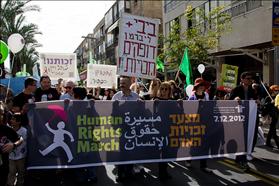Don't read this if you don't want to be confused with the facts
2018 Israel Peace Index Supports Hiddush's consistent findings
Often, the online comments on Hiddush's survey findings validate the well-known phrase: Don’t confuse me with the facts, my mind is made up. These individuals rudely reject our data as specious, but the Israel Democracy Institute's 2018 Peace Index unsurprisingly supports Hiddush's findings and analysis.
24/01/2019 22:51
Tags: International human rights day · Israel democracy Institute · Peace Index

Human rights march in Israel, source: Wikipedia
Hiddush’s unique polling focus on religious freedom and equality is of particular relevance now that Israel is preparing to go to the polls in April. This week we are repeating a number of the questions we asked in the 2018 Israel Religion and State Index, regarding the impact of these issues on the current electoral campaign. It will be of great interest to see what has transpired since the Summer, and how it corresponds to the new emerging political map. We will include an analysis of the findings in the next newsletter and will share them with partnering organizations that work to advance religious freedom and pluralism in Israel.
As expected, the findings of Hiddush's survey for 2018 International Human Rights Day in December are in line with our 2018 Israel Religion & State Index, as well as our periodic, topical polling. The special survey showed that 70% of Israel’s adult Jewish public responded that the state should recognize Reform and Conservative weddings and allow couples to make a choice, currently denied of them.
We think it would be of interest to share a selection of findings on matters of religion and state with you, which appeared in the “the Peace Index” conducted by the IDI and Tel Aviv University. As you will see, the Peace Index over time covers many of the same topics that Hiddush does in its polling, and - not surprisingly - the findings are comparable (except for those who don’t want to be confused with the facts).
2018 Peace Index findings
Directly from the Israel Democracy Institute's 2018 Peace Index:
- Whom don’t you want in the next government? We asked: “Would you or would you not want the haredi parties to be part of the next government?” The responses obtained from the Jewish public are unambiguous: a clear majority (65%) does not want a government with the haredim. On the right a majority (52%) does not want the haredi parties to be part of the next government. When the responses on the right do not include those of haredim, 60% do not want the haredim to be in the next government.
- Civil marriage: We asked: “Do you support or not support instituting civil marriage in Israel?” The answers show that the large majority of the Jewish public (64%) support marriage of this kind. On the right 52% support it, in the center 80%, and on the left 96%. A segmentation by respondents’ religiosity yielded the following distribution: secular- 94%, nonreligious traditional- 62%, religious traditional- 48%, religious- 14%, haredim- 9%.
- Religious marriages by Reform or Conservative rabbis: A similar pattern of responses emerged on the question: “Do you support or not support the recognition in Israel of religious marriages conducted by Reform or Conservative rabbis?” Fifty-nine percent of the Jewish interviewees answered this question positively, 35% negatively. A segmentation by religiosity revealed this distribution: secular- 88%, nonreligious traditional- 62%, religious traditional- 40%, religious- 9%, haredim- 2%. It is worth noting that in all the groups, the rate of support for civil marriage exceeds the rate of support for religious marriages conducted by Reform and Conservative rabbis.
- Legal equality for same-sex couples: The liberal mindset on the marriage issue was also reflected in the Jewish public’s positions on the question of whether or not to grant same-sex couples equal rights to those of other couples: 68% support providing such equality. However, level of religiosity strongly affects the rate of support for equality of this kind: secular - 85%, nonreligious traditional - 76.5%, religious traditional - 60%, religious - 36%, haredim - 19%.
- Conscription of haredi young people: A large majority (70%) of the Jewish public is in favor of drafting haredi young people. Eighty percent of the secular and the traditional favor drafting haredim, 52.5% of the religious, and 11% of the haredim. To get a more in-depth view, we asked: “Although much is said about equalizing the burden, it is well known that many young people do not serve in the IDF because they get an exemption for health or other reasons. In light of this, to what extent is it important or not important to fight to ensure that haredi young people are inducted into the army?” Here too we came up with a majority (66%) of the Jewish public who see the struggle for haredi conscription as important or very important despite the fact that many non-haredim, too, do not serve.
- Opening businesses on Shabbat: Against the backdrop of the ongoing struggles over the nature of Shabbat in Israel, and the move by Interior Minister Deri to tighten enforcement among the local authorities via the “convenience-stores law,” we gauged where the Jewish public stands on this question. We presented the interviewees with a list of seven kinds of businesses and requested that, for each one of them, they indicate the extent to which they support or oppose its being open on Shabbat. The responses we obtained show that, for six out of the seven types of businesses, a majority of the public prefers them to be open on Shabbat. At the top of the ladder of support for being open on Shabbat are cafes (68.5%) and cinemas (68%). Slightly behind them are public transportation (64%) and convenience stores and private health clinics (61%). A smaller majority also favors opening supermarkets on Shabbat (56.5%). The only category that a small minority (52%) opposes being open on Shabbat is that of garages.